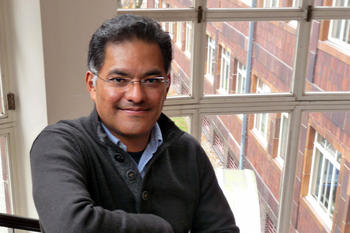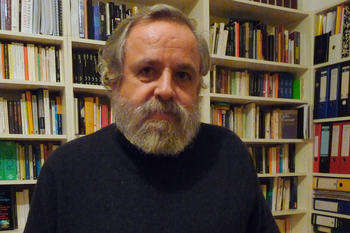Mexico: Between Yesterday and Today
Historian Ricardo Pérez Montfort and sociologist Marco Estrada Saavedra are visiting scholars at the Institute for Latin American Studies at Freie Universität
Mar 02, 2016
Marco Estrada Saavedra, a sociologist, is developing a new model of the state by analyzing the relationship between politics and society based on protest movements in particular.
Image Credit: Stefanie Hardick
Historian Ricardo Pérez Montfort has almost finished the first biography of Mexican president Lázaro Cárdenas.
Image Credit: Stefanie Hardick
The two scholars agree that the atmosphere here is perfect for dedicating yourself to research. Both scholars are using this semester-long visit to make great progress in their respective projects.
Ricardo Pérez Montfort is heavily involved in teaching activities at the Centro de Investigaciones y Estudios Superiores en Antropología Social (CIESAS) and the Universidad Nacional Autónoma de México (UNAM), and administrative duties also take up a lot of his time. For his part, Marco Estrada actually has outstanding conditions for research at the Colegio de México, a research and teaching institution that works together closely with the Institute for Latin American Studies at Freie Universität.
During his stay in Berlin, which is being supported by the German Academic Exchange Service (DAAD), Estrada offers three courses for students at the LAI and at the “Between Spaces” research training group. Although that means he is more heavily involved in the university’s operations, he is also enjoying the break from his everyday scholarly activities in Mexico, since it gives him extra time to think and read.
Historian Ricardo Pérez Montfort has almost finished the first biography of Mexican president Lázaro Cárdenas. Marco Estrada, a sociologist, is developing a new model of the state by analyzing the relationship between politics and society based on protest movements in particular. “There are very different cultures of protest in Germany and Mexico, so a direct learning process in both directions is difficult,” Estrada says.
“The view of the state and society as separate units is no longer current.”
Even so, there are links. Estrada spent a long time studying the revolutionary Zapatista movement in the Mexican state of Chiapas, which some factions on the German left viewed as a role model due to the heavy media impact of their actions in the 1990s. “The Zapatistas were one of the first protest movements to use the Internet to mobilize supporters at low cost,” Estrada explains. In Germany, he follows the other side of the political spectrum with great interest: “I’d like to study the right-wing extremist movements, but it isn’t feasible for me. I do field research. That would be dangerous for me here, because I am a foreigner and clearly dark-skinned.”
At least his stay comes at a time that is interesting for his work: The expectations that the populace has of the state during the refugee crisis and the independent assumption of societal tasks by volunteer helpers affirm his hypothesis that the previous models of the state and society as separate units are no longer current. He plans to work on a new model while he is in Berlin and hold a colloquium on it in January.
“Berlin is much calmer than Mexico City, and much more human”
A completely new political model was also what the man whom historian Ricardo Pérez Montfort is researching had in mind. Lázaro Cárdenas was the President of Mexico from 1934 to 1940. “He is viewed as the founder of modern Mexico,” Pérez Montfort explains. Cárdenas founded the PRM-PRI united party, distributed millions of hectares of land to peasant famers in a huge reform program, fought poverty among indigenous Mexicans, and nationalized the oil industry. “And yet there is no biography of him yet,” Pérez Montfort says. Cárdenas lived for a very long time. To understand him, an author would practically have to write the history of Mexico in the 20th century: “The country underwent great change during this time, and he influenced many of these developments.”
Pérez Montfort has been studying Cárdenas for 15 years. The political biography is an exception within his research. He has worked more extensively on the cultural history of Latin America. Subjects of research have included national stereotypes and fandango festivals in the state of Veracruz. Together with his wife, an anthropologist, he has made documentary films about the indigenous peoples of the Mexican jungle. His last book, on the history of Mexican drug policy, was also started during a stay in Berlin. “Thanks to the ‘Between Spaces’ research training group, which includes German and Mexican students and scholars, I have been to Berlin various times, and I now have really good friends here. Berlin is much calmer than Mexico City, and much more human.”
Asked if there isn’t something the two scholars miss now that they are far from home, it doesn’t take them long to find an answer. Pérez Montfort says, “My dogs. I couldn’t bring them with me.” And Estrada laughs and says something most Berlin residents can probably sympathize with: “The sun!”
This text was originally published in German in campus.leben.


